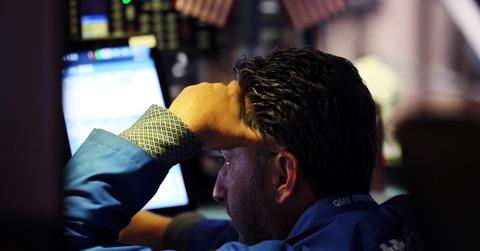What Happens If a Stock Price Goes to Zero? All the Details
As the value of 401(k)s drop and many stocks lose value, investors may wonder what happens if a stock price goes to zero. Investors lose their money in that case.
June 23 2022, Published 12:02 p.m. ET

Investors know before they put any money into the stock market: the value of any individual company or stock isn’t guaranteed to last. Your investments in the market can increase in value, but they can also decrease. While a full stock market crash may happen rarely, what happens if a stock price goes to zero for one specific company?
The price of any given stock depends on supply and demand, which are impacted by a number of factors. When something causes investors to lose faith in a stock, the stock price goes down as demand declines. It’s possible for a stock price to drop all the way to zero, which is one of the risks investors take on when buying into companies.
A zero stock price means the investment is essentially worthless.
Whenever a stock drops dramatically, investors lose money. The value of their holdings goes down along with the stock’s price. If the price of company “X” drops to $0, no matter what price you paid for the stock, the value of those shares drops to zero.
A sharp drop to zero or nearly zero also generally means the exchange will delist the stock. Major exchanges usually delist when a stock has remained below $1 per share for a certain period of time.

NASDAQ
Is bankruptcy the same as a zero stock price?
The stock price decreasing to zero may not have the same impact as a bankruptcy. When a company declares bankruptcy, it may be left with some assets that have value. Assets may be sold to pay preferred stockholders, banks, and other creditors, and anything remaining may be distributed among remaining shareholders.
However, it’s possible that nothing will remain after bankruptcy proceedings, meaning investors would lose whatever they had put into the bankrupt company. Even if there's compensation due to bankruptcy, it’s likely only pennies on the dollar.

Can you lose more money than you invest if a stock goes down?
If a stock experiences a sell-off or a period of panic selling, the price of the stock goes down quickly, which causes the price to drop even more. As long as you invest your own funds, you won’t lose more than your initial investment. The value of your holdings can drop to zero, making your investment worthless, but you won’t owe anything.
However, if you’re attempting to short a stock, you take on debt and could lose money if the stock drops to zero. Short selling requires very specific conditions to work out favorably for the short seller, and a zero stock price may not be best.
Although it’s rare for a stock to lose all of its value, it does happen. That’s one reason retail investors are encouraged to hold diversified portfolios of stocks in different sectors. Having all of your retirement or pension funds invested in a single company is extremely risky, as shown by the Enron scandal. Your 401(k) may lose value temporarily, but being diversified across multiple stocks can help minimize long-term losses.
